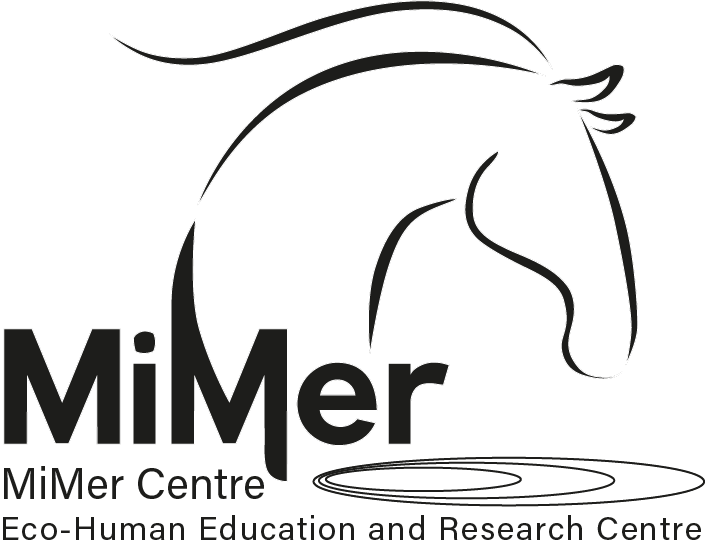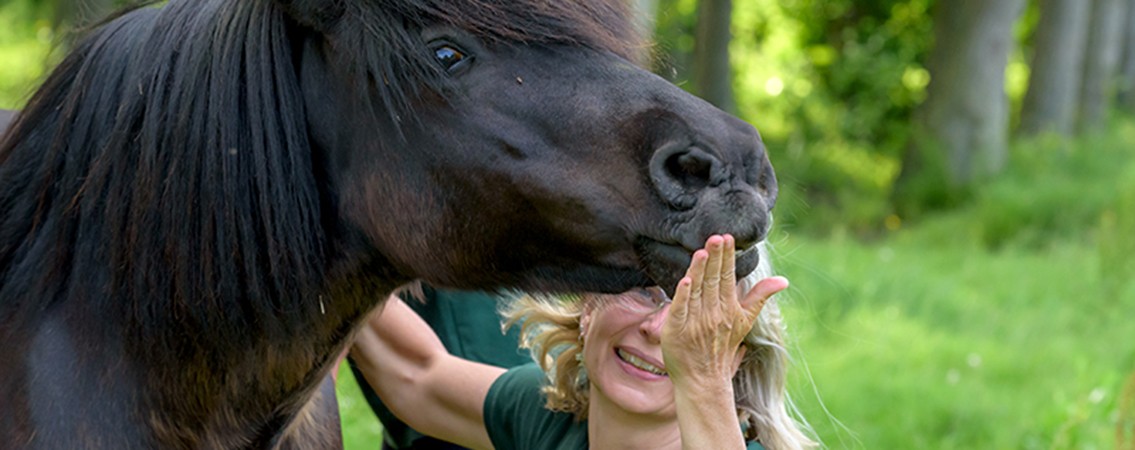I am an EMHP – an Equine Mental Health Professional…
Or – how do we get to know the inner life of horses? How do we really get to know them? How do we know what they feel? Experience?
When I work in teams in equine assisted activities and therapies – this is what I am. I am an EMHP – an Equine Mental Health Professional. It took me 7 years to figure that out… or at least I am testing it out…
I "went" from being an equine specialist to an equine cognitive scientist/professional – to just being an equine professional – and considering calling myself an equine behavioral professional, but stuck with just equine professional, EP. I think I a might call myself that ahead also, but nevertheless, finding out that I am (might be?) an EMHP – meant a lot to me. It clarified things for me, helped me distinguish between words and their content. It helps me see beyond theories – to see the horse – also behind his behaviors…
I am an observer of behaviors. For me, behaviors are language – communication. It can be self-directed language (scratching oneself) but is also other-directed language (asking to be scratched). Since horses are non-verbal, they talk with their behaviors. This is why it is so important for all equine professionals working in any kind of equine assisted setting – to know about, to recognize equine behaviors – to know that they are context bound, and also very individual. To learn to understand behavior in horses (or in anyone) we need to see a species-specific behavior only as starting point. Then we need to add the layer of context, then the layer of the individual, then the layer of withheld, or re-/mis-, de-placed behavior, or behavior that comes out as coping strategies (stereotypies), etc. Horses have as many ways of using behaviors as we humans have, and we all know how confusing and contradictory human behaviors can be – or humans' lack of behaviors! The same goes for horses…
But…. (a "bad" habit of mine, "butting" ;-) ) – if the behavior is the language, the communication – what are they telling us? What does the behavior mean? Who is the sender behind the behavior? Who is the horse?
For humans in psychotherapy – who goes there to maybe change some of their behaviors – they can be met by providers who work with behavior modification – or by providers who work to help the person understand their behavior and leave it open for them to chose to change it or not. But I think all therapist stresses that a person's behavior is not the same as who they are. Behaviors can be changed. They don't define who we are. Behaviors are questions for needs to be met, for wishes/wants to be had, for fantasies to come true (the latter at least in humans…). Behaviors are also protection, repetition to solve old problems/conflicts, or they are numbing strategies…
I found it limiting to call myself an equine behavioral professional, because of this. Yes, I spend a lot of time looking at behaviors, to define contexts, to understand the function of a behavior. But…. There is a horse behind the behaviors he shows. A horse, a subject, an individual, an agent, with a personality, a past, a specific outlook on life, a consciousness, with a certain way of remembering, learning, make decisions, problem solve, explore, be creative, make friends, bond and entertain all kinds of relationships – etc, etc. Even if this is part of what we look at in cognitive sciences – I found it limiting to look at horses only from a strict cognitive standpoint too. Even if emotions are part of what a cognitive scientist looks at – the focus often lays on cognitive functions that has to do with our different thinking capacities, not on our experiences of our own inner life, or relationships…
I read up on Panksepp and our common basic mammalian emotions and found this passage, bear with me, it is long "The only reason that cognitions have been so commonly envisioned to lead the way is because many practitioners of cognitive science, and hence most psychotherapeutics, have yet to assimilate the evidence about brain emotional systems from basic affective neuroscience principles. This bias is partly a residue of behaviorism, a very incomplete science that many have now rejected because of its narrow "externalist" prison-house mentality, which had just one precious gem to offer psychotherapy – behavior modification based on the rearrangement of reinforcement contingencies, in the context of no coherent vision, even a rejection of the affective interior of the mammalian mind. However, that externalist view continues to skew cognitive thinking in the field and to lead to continued conceptions of organisms as "passive" association-based, information-processing machines. That a deep neuroevolutionary psychology, based on a cross-species affective neuroscience, can now offer is a more realistic alternative – an "active" organism view wherein all mammals are endowed with rich neurobiological, internally experienced emotional processes […], a view that highlights how the active organismic concepts need to replace the passive "information-processing" views of behaviorism and cognitive science. We can move in uniquely new directions through an understanding of primary process emotions – namely, those brain-mind (body – my add) processes that constitute the neuroaffective complexities that lie under those behavioristic oversimplifications called "rewards", "reinforcements" and "punishments" and that guide the social constructions and clinical reconstructions of the human minds."
When I thought about it – in equine assisted therapies – we talk about how to protect the horse from mental and physical overwhelm, to protect him from becoming too stressed out – but we seldom talk about how we can promote better equine mental health. But…. What we work with in EAT is to facilitate better mental health in clients. I am convinced we can do both! Logically, that would require a human mental health professional in the team – to focus on the human – and an equine mental health professional to focus on the horse – and a joint agenda to focus on the horse-human interaction – to find where horses and humans ethologically overlap, to use knowledge in comparative psychology, to use what we know about horses AND humans, their social dynamics, their behaviors – to facilitate human AND equine growth!
As I see it, and I am a big believer in NOT throwing out the baby with the bath water – we need to use what we know about behaviors – to use what we know about cognition – to use what we know about neuroscience – also the one that focus of affects – to – of course – use what we know about psychology (also comparative) – to use what we know about bodies/somatics, etc – and connect it all! Because horses are – like humans – highly complex beings, of course…
If we choose to stick to behaviorisms, to cognition, to neuroscience, etc – as explanation models – we will lose out on information and on valuable tools. To look at the broader picture – to be more eclectic – will benefit both horses and clients (actually all humans…).
So what we really want to both protect and to promote in EAT – is human AND equine mental health. As I see it, it still requires of an equine professional in the field, to know about equine biology – we still have a lot of serious welfare issues in our field that is about what horses eat, how much they are allowed to move, where they live, if they are allowed horse companions etc – but… it does not take away our responsibility to also look after and promote equine mental health.
Hence – I am an equine mental health professional :-) – and I am going to use all kinds of explanation models to learn more – and to teach about it!
PS. I am some other things too – I don't like to limit myself – and I love the combination of research and practical applications of what I learn, but I like the idea of being an EMHP!
Picture showing the need for reciprocity - also in horses (and in horse-human relationships!)
Panksepp, J. (2009) Brain Emotional Systems and Qualities of Mental Life. From Animal Models of Affect to Implications for Psychotherapeutics. In: The Healing Powers of Emotion. Affective Neuroscience, Development, and Clinical Practice. Ed by: Fosha, D., Siegel, D. J. and Solomon, M. W.W. Norton and Company.
When you subscribe to the blog, we will send you an e-mail when there are new updates on the site so you wouldn't miss them.




Comments